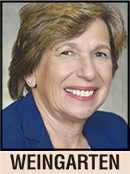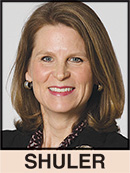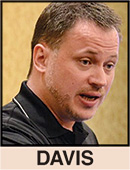By MARK GRUENBERG
PAI Staff Writer
Labor’s political campaign this year will be driven from the bottom up, emphasizing issues, as state federations and central labor councils make the key political decisions and then fit candidates into the issue matrix for endorsements.
So says American Federation of Teachers (AFT) President Randi Weingarten. She and AFSCME President Lee Saunders are jointly working out that political plan, she told a small group of reporters at a June 13 session during the AFL-CIO convention in Philadelphia. Saunders chairs the federation’s political committee.
The AFL-CIO and allies include other big and independent unions such as the Teamsters,
Service Employees and the National Education Association. Weingarten, AFL-CIO President Liz Shuler and others interviewed said Organized Labor will concentrate on races in 10 key states, including Ohio, Pennsylvania, Minnesota, Michigan, Florida and Georgia.
Other possibilities include Nevada, Arizona, Wisconsin and North Carolina. All have gubernatorial races and all but Minnesota have U.S. Senate races.
The federation, like other progressive groups, faces a key election this fall, with pro-worker lawmakers holding a narrow edge (currently 220-208 Democratic) in the House and a 50-50 tie in the Senate—a deadlock often broken against workers and their allies by defecting renegade Senators Joe Manchin (D-W. Va.), and Kyrsten Sinema (D-Ariz.).
And while those two senators will not face the voters until 2024, enough Senate Democratic incumbents are on the ballot this fall that a net loss of one seat would throw control to current Senate Minority Leader Mitch McConnell (R-Ky.), a Labor foe leading a caucus composed mostly of rabid Trumpites.
AFL-CIO POLITICAL ROLE GROWS
But the switch is also important because the Federation and members of its 57 unions, plus the big independent unions, have become key cogs in state, local and congressional campaigns, at least on the progressive side, while the Democratic Party’s structure has withered.
Worker foes rely on a highly organized structure of white supremacists, “Christian” megachurches, and mass right-wing movements, many of them funded by the financial and corporate classes whose interest is in squashing workers, women, students and other foes.
Their key tools include disinformation, voter suppression, downright lies and schemes to divert voters’ attention away from the Republicans’ and Trumpites’ existential threat to the future of democratic government in the U.S., as shown by the Jan. 6, 2021, coup attempt.
 The switch in structure and emphasis is part of “the modernization of the AFL-CIO” that Shuler, elected by acclamation to her first full term as head of the 12.5-million-member Federation, is pushing, Weingarten explained.
The switch in structure and emphasis is part of “the modernization of the AFL-CIO” that Shuler, elected by acclamation to her first full term as head of the 12.5-million-member Federation, is pushing, Weingarten explained.
That modernization, she said – details to be announced – is supposed to make the Federation “better in all of our work,” said Weingarten, a strong Shuler supporter who seconded Shuler’s nomination to a full term at the conclave’s July 11 session.
“In politics, we are trying something new. We’re not going to parachute people in,” to specific states or races, she said, but will determine “what community issues we need to solve, who should have our back, and who will help us.”
A BIG PUSH IN GEORGIA
Georgia was represented at the convention on June 14 by Democratic gubernatorial nominee Stacey Abrams, who described her successful registration and get-out-the-vote organizing that turned the Peach State from Republican red to swing state purple in 2020.
With a big assist from Unite HERE, Abrams’ group carried Georgia for Democratic presidential nominee Joe Biden and Democratic U.S. Senate nominees Jon Ossoff and the Rev. Raphael Warnock, producing that 50-50 tie.
Abrams is back for a rerun against incumbent Republican Gov. Brian Kemp. He narrowly defeated her in 2018 after, as Secretary of State, he purged voter rolls of hundreds of thousands of people, most of them Blacks, like Abrams.
The Biden administration’s pro-worker record will be a big part of Labor’s message to get workers to the polls, Shuler told reporters. Biden addressed the convention on June 14.
 “Our job is to educate our members that their votes matter, just as we did in 2020,” Shuler said. Biden’s many successes including the American Recovery Act and the five-year, $1.2 trillion infrastructure law give them “a lot to point out,” she said.
“Our job is to educate our members that their votes matter, just as we did in 2020,” Shuler said. Biden’s many successes including the American Recovery Act and the five-year, $1.2 trillion infrastructure law give them “a lot to point out,” she said.
“It’ll be issues-based, using the grassroots all around,” Shuler said. “We’re putting a trainer and coordinator in each Central Labor Council,” she said, to train unionists not just on registering people to vote but protecting their votes and listening to their concerns.
“We’re trying to do politics through state federations and central labor bodies,” said Weingarten. “I have made the argument for years that they need more muscle to do their jobs. We need to modernize them and make them a force.”
The delegates passed a resolution on June 14 committing the AFL-CIO to that goal.
To create that force in time to implement its decisions before the fall campaign, the Federation will establish a task force “to work with them and if we can change them, to do it.”
That may require putting more money into those levels, she admitted.
“But money can’t be the first thing we do. Programs are first, then money,” she said.
MAIL, PHONE BANKS, TEXT BANKS, TOO
Weingarten wasn’t the only unionist contemplating change. Jerame Davis, executive director of Pride@Work, said the Federation’s constituency groups – including his own, will work together in “cross-pollination in key states to engage our members,” rather than each running its own separate operation.
 “We’ll be doing mailing, phone banking and text banking,” he said. “People have already been registering to vote at Pride festivals.”
“We’ll be doing mailing, phone banking and text banking,” he said. “People have already been registering to vote at Pride festivals.”
That “cross-pollination” would bring together the Coalition of Labor Union Women, Pride@Work, Labor’s Council for Latin American Advancement, the A. Philip Randolph Institute, the Coalition of Black Trade Unions, the Asian-Pacific American Labor Association (APALA) and the newest of recognized organizations, the Union Veterans Council.
But in an indication that there will still be political problems affecting specific groups of workers, Vivian Chang and Katie Moy Mostris of APALA said their members have a media issue – that many networks catering to Asian-Americans and Pacific-Americans are owned by the radical right and broadcast false and misleading information.


